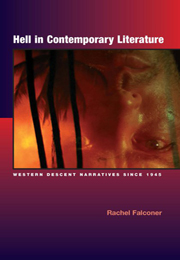Book contents
- Frontmatter
- Contents
- Acknowledgements
- Introduction: Descent and Return – the katabatic imagination
- 1 Hell in Our Time
- 2 Chronotopes of Hell
- 3 Auschwitz as Hell
- 4 Surviving with Ghosts: Second-generation Holocaust Narratives
- 5 Katabatic Memoirs of Mental Illness
- 6 Engendering Dissent in the Underworld
- 7 Postmodern Hell and the Search for Roots
- 8 East-West Descent Narratives
- Epilogue: Katabasis in the Twenty-First Century
- Appendix: Primo Levi, ‘Map of reading’
- Bibliography
- Index
8 - East-West Descent Narratives
Published online by Cambridge University Press: 12 September 2012
- Frontmatter
- Contents
- Acknowledgements
- Introduction: Descent and Return – the katabatic imagination
- 1 Hell in Our Time
- 2 Chronotopes of Hell
- 3 Auschwitz as Hell
- 4 Surviving with Ghosts: Second-generation Holocaust Narratives
- 5 Katabatic Memoirs of Mental Illness
- 6 Engendering Dissent in the Underworld
- 7 Postmodern Hell and the Search for Roots
- 8 East-West Descent Narratives
- Epilogue: Katabasis in the Twenty-First Century
- Appendix: Primo Levi, ‘Map of reading’
- Bibliography
- Index
Summary
A week before the start of hostilities in Iraq in March 2003, a BBC reporter interviewed American soldiers about their mental preparations for war. Among the images filmed by the camera crew, and televised on BBC News on 10 March, was that of an American soldier sitting in the desert, reading Dante's Inferno in an English translation. One can only speculate as to why that particular US soldier was reading the Inferno at that moment in Iraq. What seems more certain is that by televising the image of the soldier reading Dante, the BBC was inviting us to think about the invasion of Iraq in terms of a Dantean descent to Hell. Moreover, given the widespread public protests in Britain against the war and the BBC's willingness to challenge the government on its decision to invade, one might also conclude that this figure of the descending military hero – the new crusading pilgrim with his Dante in hand as a guide through Hell – was intended to be viewed as an ambivalent figure. For whom would this Western descent narrative prove to be Hell: for Saddam's regime, for the Iraqi people or for the Western invaders themselves? Despite the differences in historical contexts, comparisons with Vietnam were ubiquitous in the US and UK media. Beside the American soldier and Dante, then, many viewers may have sensed the ghostly presence of another descent hero, Captain Willard, played by Martin Sheen in Francis Ford Coppola's anti-Vietnam war film, Apocalypse Now (1979).
- Type
- Chapter
- Information
- Hell in Contemporary LiteratureWestern Descent Narratives since 1945, pp. 196 - 223Publisher: Edinburgh University PressPrint publication year: 2004



